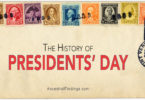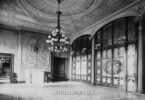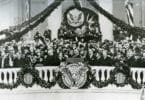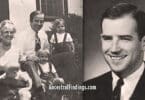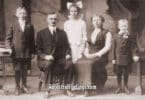Born John Calvin Coolidge Jr. on July 4, 1872, in Plymouth Notch, Vermont, Calvin Coolidge grew up in a small, rural town that profoundly shaped his values and personality. Life in Plymouth was simple and quiet, a fitting backdrop for the boy who would one day be known as “Silent Cal.” His ancestry traces back to the earliest American settlers, giving him deep New England roots that influenced his conservatism and belief in self-reliance.
Father: John Calvin Coolidge Sr. (1845–1926), a farmer and local politician, served in the Vermont House of Representatives and Senate. He also ran a general store and served as justice of the peace. His father’s emphasis on duty and hard work instilled in Coolidge a deep sense of responsibility. In a symbolic moment, Coolidge Sr. swore his son in as president after Harding’s sudden death.
Mother: Victoria Josephine Moor Coolidge (1846–1885) was known for her gentle, nurturing nature, but she died when Calvin was just 12 years old. This loss had a profound impact on the future president, leaving him emotionally reserved, a trait that would shape his later public persona.
Grandparents:
Calvin Galusha Coolidge (1815–1878), Calvin’s paternal grandfather, was a hardworking farmer who embodied the self-reliance and modesty typical of rural New Englanders.
Sarah Brewer Coolidge (1823–1906), Calvin’s paternal grandmother, played a stabilizing role in his early life after the death of his mother.
The Coolidge family lineage extended back to colonial settlers, a fact that provided the future president with a strong connection to America’s early history and the pioneer spirit. This heritage also fueled his conservative approach to governance, rooted in the belief that the strength of the nation lay in its individuals and their ability to work hard, without much interference from government.
Childhood and Early Experiences
Calvin Coolidge’s childhood was steeped in the traditions of rural Vermont life. His upbringing was simple but disciplined, and he developed a strong sense of duty and humility that would define his political career.
Story 1: The Farm Boy
As a child, Coolidge helped his father with farm work. Milking cows, gathering eggs, and cutting hay were all part of his daily routine. These tasks weren’t glamorous, but they taught him the virtues of patience and diligence. In his autobiography, Coolidge reflected on those early lessons, saying, “If you see ten troubles coming down the road, you can be sure that nine will run into the ditch before they reach you.” This cautious and thoughtful approach to problems would become a hallmark of his presidency.
Story 2: A Mother’s Influence
Coolidge’s mother, Victoria, was a deeply religious woman who instilled in him a sense of duty and moral responsibility. Her sudden death when Coolidge was just 12 years old was a turning point in his life. He later recalled, “The greatest grief that can come to a boy came to me. Life was never the same again.” Her loss left him emotionally reserved and further deepened his stoic nature, traits he carried into adulthood and his presidency.
Story 3: The Night Watchman
As a teenager, Coolidge took a job as a night watchman at a local factory. While it wasn’t a glamorous position, he approached it with pride and seriousness, often walking the grounds alone, ensuring everything was secure. This job reinforced his sense of personal responsibility and attention to detail, qualities that later made him an effective, though quiet, leader.
Story 4: A Father’s Oath
Coolidge’s father, John Calvin Sr., was a significant figure in his life. As a local justice of the peace, Coolidge Sr. frequently involved his son in town meetings and other civic duties. One formative moment occurred when Calvin witnessed his father administering an oath of office to a neighbor. This early exposure to public service left a lasting impression, foreshadowing the night in 1923 when Coolidge’s father swore him in as president at their Vermont home after the sudden death of President Warren G. Harding.
Story 5: The Law Student Who Struggled to Speak
Coolidge’s early attempts at public speaking were far from successful. While studying law in Northampton, Massachusetts, he once gave a speech so poorly that he retreated even further into himself. Public speaking terrified him, but he knew it was essential for his future career. Instead of giving up, Coolidge practiced tirelessly, eventually mastering the art of concise, impactful speeches—a hallmark of his later political style. His famous brevity and sharp quips were the result of years of struggle and persistence.
Political Rise
Coolidge’s political career began in Northampton, Massachusetts, where he worked as a lawyer. His quiet, diligent nature and ability to navigate complex political waters led him to rise steadily through the ranks of local government. He served as mayor of Northampton, a member of the Massachusetts state legislature, lieutenant governor, and eventually governor of Massachusetts.
His handling of the Boston Police Strike of 1919 as governor cemented his national reputation. When the city’s police force went on strike, Coolidge responded forcefully, stating, “There is no right to strike against the public safety by anybody, anywhere, anytime.” This firm stance against labor unrest won him widespread approval and propelled him onto the national stage, setting the stage for his selection as Warren Harding’s vice president in 1920.
The Accidental President
When President Harding died suddenly in 1923, Calvin Coolidge found himself thrust into the presidency. In a now-famous moment, Coolidge’s father administered the oath of office by lamplight at the family home in Vermont. Coolidge’s calm and measured demeanor during this transition reassured the nation during a time of uncertainty.
The Coolidge Administration: Conservative Values in Action
Coolidge believed deeply in small government, personal responsibility, and laissez-faire economics. His administration focused on reducing taxes, limiting government intervention in business, and cutting federal spending. These policies contributed to the economic prosperity of the “Roaring Twenties,” though historians debate the long-term effects of his hands-off approach, especially in the lead-up to the Great Depression.
Some key aspects of his presidency include:
Tax Cuts: Coolidge and Treasury Secretary Andrew Mellon implemented significant tax cuts aimed at stimulating business growth. They believed in trickle-down economics, and for a time, their policies seemed to work, contributing to the prosperity of the 1920s.
Limited Government: Coolidge was a staunch believer in limited government intervention, especially in the economy. He believed that prosperity came from individuals, not government programs.
Civil Rights: Although not a major focus, Coolidge signed the Indian Citizenship Act of 1924, which granted full U.S. citizenship to all Native Americans. His administration’s civil rights record, however, was minimal beyond this.
Personal Life and Tragedy
Coolidge’s personal life was marked by both joy and sorrow. He married Grace Anna Goodhue in 1905, and they had two sons. However, tragedy struck in 1924 when their younger son, Calvin Coolidge Jr., died at the age of 16 from an infection. This personal loss had a profound effect on Coolidge, who became even more withdrawn and introspective afterward. He once remarked, “When he went, the power and glory of the Presidency went with him.”
Retirement and Death
After leaving office in 1929, Coolidge retired to Northampton, Massachusetts, where he lived quietly, writing his autobiography and occasionally commenting on political matters. He passed away unexpectedly from a heart attack on January 5, 1933, at the age of 60. He is buried in Plymouth Notch, Vermont, beneath a simple gravestone that reflects the modesty of his life and career.
Legacy
Calvin Coolidge’s presidency is remembered for its focus on small government, fiscal conservatism, and the economic boom of the 1920s. However, his administration has also been criticized for its lack of preparation for the coming economic collapse of the Great Depression. Despite this, Coolidge remains an enduring symbol of self-reliance, quiet leadership, and the conservative values of early America.
Coolidge’s life and presidency were shaped by his early experiences in Vermont, the tragedies he endured, and his steadfast belief in personal responsibility. His childhood stories provide insight into the quiet strength of the man who led the nation through a period of relative peace and prosperity but whose legacy remains more complex than his reputation for silence might suggest.
Here are some of the best books on Calvin Coolidge for further reading…
This highly regarded biography thoroughly examines Coolidge’s life and presidency. Shlaes portrays Coolidge as a president who valued restraint in both government and personal life, offering a nuanced view of his administration and personal philosophy. This is a great resource for understanding Coolidge’s impact on the 1920s and his legacy.
“The Autobiography of Calvin Coolidge”
This book, Written by Coolidge, provides firsthand insights into his upbringing, political career, and thoughts on leadership. It’s a relatively short but revealing glimpse into the mind of a president known for saying very little publicly. This is a must-read for anyone interested in Coolidge’s personal reflections.
This book examines Coolidge’s leadership and governance principles and explores why his approach is still relevant today. Johnson argues that Coolidge’s philosophy of small government and personal responsibility holds important lessons for modern leadership.
“The Quiet President: Calvin Coolidge” by Donald R. McCoy
McCoy provides a detailed and balanced biography, digging deeper into Coolidge’s character, policies, and personal life. The book also contextualizes his famous silence and explores how his personality influenced his governing style.
“Calvin Coolidge: A Documentary Biography” by David Pietrusza
Pietrusza presents a wide-ranging collection of documents, speeches, and personal writings from Coolidge’s life. It’s a more academic resource but offers a detailed look at the primary sources surrounding Coolidge’s time in office, providing readers with the materials to form their own views of his presidency.
“The Political Thought of Calvin Coolidge: Burkean Americanist” by Thomas J. Tacoma
This book explores Coolidge’s political philosophy, drawing parallels between his ideas and those of the conservative thinker Edmund Burke. It provides a deeper intellectual analysis of Coolidge’s governance and his belief in small government, making it ideal for readers interested in political theory.

